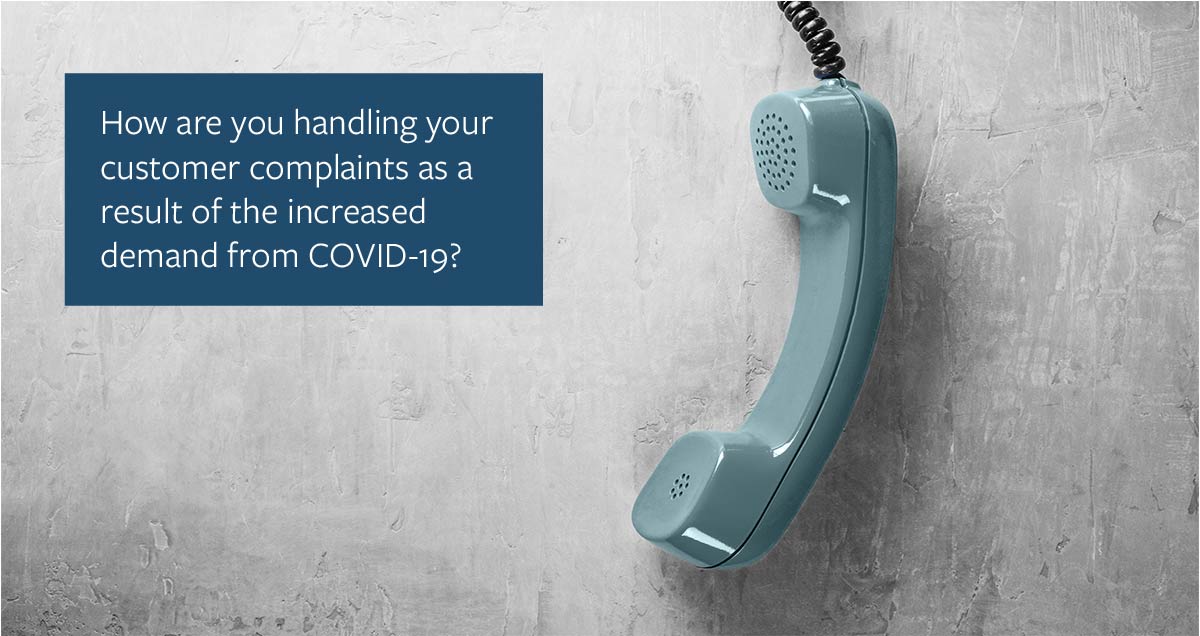Handling your customer complaints as a result of the increased demand from COVID-19
Firms are inundated with immense amounts of workloads placed upon them as a result of COVID-19. Fiscal and monetary policies have been reviewed and changed to accommodate financial support for individuals and businesses. This has left global lenders in a flat panic as they battle to cope with the sheer amount of additional work placed upon them and their remote workforces. Customer complaints have risen significantly as a result of increased demand.
If your firm has been battling to keep up with the changes in workload, fear not. We have put together some key questions and tips for your team to review your current customer complaints as well as mitigate a potential new wave of complaints during and post-pandemic.
- Your customer complaint handling should be its strongest now
Your firm has probably received an influx of complaints as a result of mixed communication or customers battling to get through to you. It is still imperative that your Customer Complaint handling resumes as normal. We have found that remote workforces handling additional pressures on firms can help alleviate the further work your permanent staff cannot get too. Contingent workforces have dealt with inquiries (telephone and email) from potential applicants, especially where time is of the essence, and loans must be processed efficiently and effectively.
- Coping with an influx of work with a remote workforce
Creating a thriving remote workforce during a pandemic is no easy task for any firm to manage. Now with more work than ever before seen, firms will need to manage their remote workforces to cope with the high demands placed upon them. Keeping your remote teams up to date with new workloads and practices can be difficult, so make sure you have a digital system that communicates with all your internal software as well as online platforms. Digital transformation is key and will help ensure that you can effectively and efficiently communicate with your remote teams with ease. Set up your digital systems and invest in your digital capabilities moving forward to ensure that business can go uninterrupted. Communication is key to all staff and this increases tenfold when in w remote setting. Digital will once again help this happen as the lines of communication will not be blurred or disrupted with old systems that inhibit it.
- Managing your operational challenges to avoid further complaints
CBILS, PPP programmes and other schemes of this nature and size being rolled out in such a short amount of time will face several challenges, one of them being the disbursement of direct payments to individuals and businesses having to apply for a record number of commercial loan applications. Car finance and mortgage lenders have been instructed/are being encouraged to offer repayment holidays – either from just the capital element or in some cases from the whole payment.
- Traditional underwriting methods will not be enough to adapt to the new time constraints placed on banks to process the plethora of credit appraisals that the government is guarantying 100% of. More efficient methods need to be adopted to save small businesses and to process the loans in record times.
- Invest in digital identification technology. Firms are finding incredibly difficult to assess the viability of the applicant whilst ensuring funds are not denied to otherwise worthy applicants. Another key issue is that of verifying the individual remotely as well as their documentation. Invest in technologies that can verify according to the necessary regulated standards.
- Ensure your KYC/AML systems are ready to fight COVID criminals
To avoid further complaints and inquiries around financial crime in your firm, a reviewal of your systems and processes is needed. KYC and AML efforts will have to be increased to ensure that not only those who are eligible will get access to funds but also effectively and efficiently. Another key issue is that of the nature of the remote vetting and CDD. Limited face to face interactions could affect information gathered and so more caution needs to be implemented when conducting CDD remotely.
Organisations need to be more vigilant and adopt stronger whistleblowing monitoring systems ensure staff are constantly updated on the latest fraudulent activities and what to look out for, review their AML/KYC risk assessment and ensure three lines of defence as resilient as possible and can they provide reassurance from potential COVID-19 criminal attacks. What controls could be exposed and weak? What key risks could be associated with new coronavirus hacks? This also poses the question of the implementation of digital IDs in countries like the UK. CDD processes will have to more even more vigilant when vetting is concerned, as a lack of face to face interaction and certified documentation could pose a risk for potential fraud.
Another key element is organisations will need to ensure that their whistleblowing procedures are strong especially in remote settings. This is especially important when keeping staff updated on the latest breaches and criminal trends. The more educated your staff, the more likely they are to pick up on potential risks and threats. Tech enhanced compliance. AI, machine learning, and automation can help your firm with strengthening compliance systems.
- Dealing with PPI complaints
Yes, there will still be PPI complaints, so it is important that they do not get ignored in the mix of COVID-19 related complaints. Customers need to be updated on when they can receive a final response as well as any update the firm may have. Most PPI claims should be receiving final communications and updates during the summer. The FCA and other regulatory bodies will still be checking that all complaint handling not only carries on as normal but is done so in a fair and timely manner. Do not ignore the regulation as it will not be eased on any firm during the pandemic.
- Post pandemic administration to avoid future disputes
Post pandemic will require just as much administrative effort as during the pandemic. Additional communications, complaint handling, and several other administrative demands will need to be planned for when business resumes back to normal post-pandemic. Firms are planning for this influx of work now in hopes that when lockdowns ease, they are equipped with the right contingent workforce to get them back on track and resume business as normal.
Read more about how we can help your business during COVID-19.

